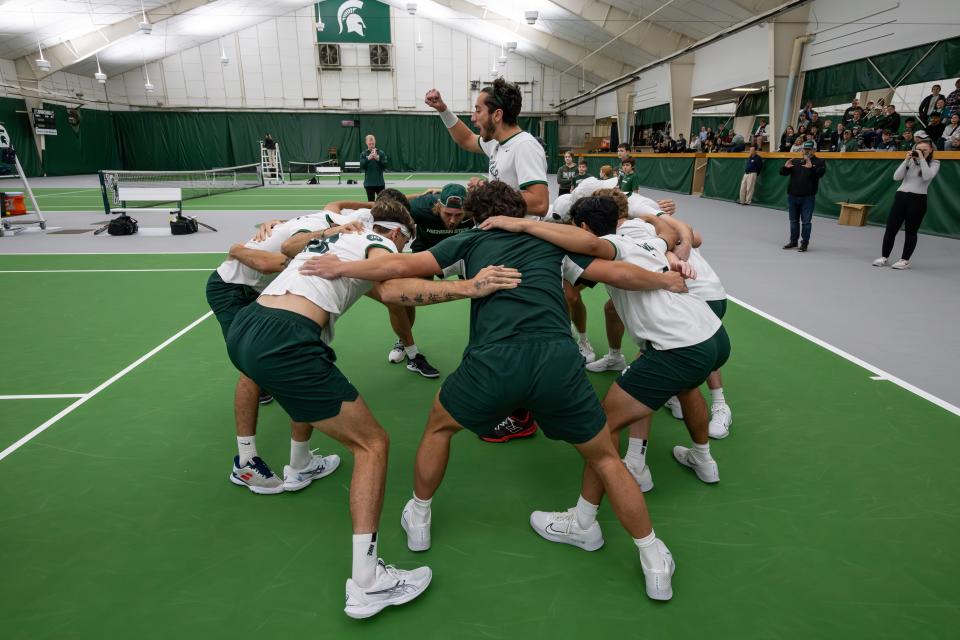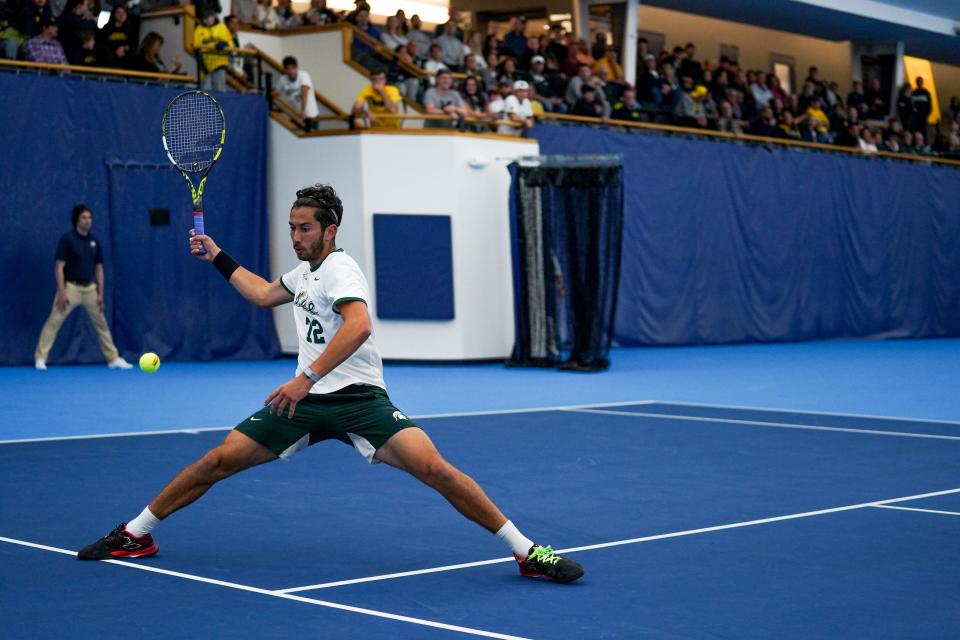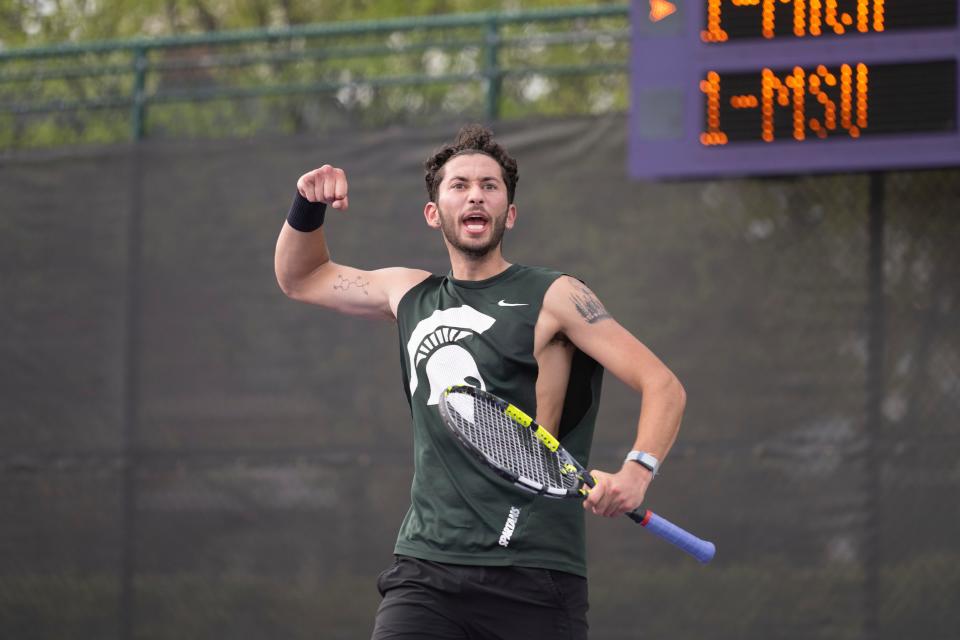Couch: Led by Ozan Baris, MSU's men's tennis program has risen rapidly. This week's NCAA championships are the next step.

EAST LANSING – It was only a few days ago that Michigan State tennis star Ozan Baris realized just how much his teammates meant to him, how badly he wanted them to succeed along with him.
The Spartans’ had just lost to Michigan, 4-3, in the Big Ten tournament. Baris had won both of his matches — at No. 1 singles and 1 doubles. “I did my job,” he said. “But the way I felt … it was a wake-up call for me.”
Tennis is not inherently a team sport, even when you’re on a team. You can only control so much. In singles, beyond your coaches, you’re all you’ve got. It’s how someone like Baris is brought up in the sport — playing for himself, grinding on his own. And once he’s a pro on tour, it’ll be that again.
But today, he is also a sophomore in college who is part of something bigger than himself. And understands he’s “a big piece” of the foundation of an MSU men’s tennis program enjoying a rapid rise under second-year head coach Harry Jadun, another local product.
The fruits of the work of Jadun and his staff and Baris and his teammates can be seen this week when the 19th-ranked Spartans begin play at 11 a.m. Friday against 43rd-ranked Denver in Boston in the first round of the 64-team NCAA championships. If MSU wins Friday, it'll likely face 12th-ranked Harvard, the host of MSU’s four-team pod.
If MSU survives the weekend, the Sweet 16 awaits a week later, perhaps at fifth-ranked Kentucky or, if 26th-ranked Illinois were to upset the Wildcats, in East Lansing.
That’s a next-week issue. This week alone is unprecedented stuff for the Spartans, who, collectively, are in the NCAA championships for the first time in 11 years and the second time in program history. Jadun, who grew up in East Lansing, was on that team in 2013. The program was in a different place then. If that group played against this year’s squad …
“We would get smoked. I would have,” Jadun said. “We had some great players and we really competed hard back then, but we didn’t really have …”
They didn’t have the likes of Ozan, already an All-American, this year’s Big Ten player of the year, ranked No. 9 in the country, or LSU grad transfer Ronald Hohmann, who’s been ranked as high as No. 15, or redshirt freshman Aristotelis Thanos from Greece, who has Davis Cup experience and was the Big Ten freshman of the year, or a transfer like Sebastien Collard, twice the Sun Belt Conference player of the year at South Alabama. They nearly also had Daniel Merida from Spain, who would have been the top recruit in the country, if the NCAA had approved his transcripts.
“We just have some studs and horsepower,” Jadun said. “And then we have the depth to back it up.
“If you look at the best teams in the country, you can have a couple of guys that come in as high-ranked studs. You have a couple guys that develop, all of a sudden, it's a recipe for success.”

When Jadun was an assistant, he thought MSU had the profile of program that could win big. Late in long-time coach Gene Orlando’s tenure, Jadun believed the success we’re seeing today was “bubbling under the surface” and credits Orlando for putting him in position to succeed almost immediately.
But he didn’t see it happening quite this quickly. It began with landing Baris, who’d grown up down the road in Okemos, trained at Court One and had spent a good chunk of his high school years away from home training or playing in tournaments, three weeks out of a month, nine months a year, he said.
Coming to MSU wasn’t as much about staying home as it was coming home.
Jadun also had the advantage of recruiting Baris in sport where the team aspect is an added element, but not needed to win an NCAA title or develop into a pro. For example, Baris will also be competing individually in the NCAA singles and doubles championships later this month for the second year in a row — back with doubles partner Max Sheldon. Hohmann will be making his third trip to the singles championships.
“I mean that's the biggest selling point, especially with a kid like Ozan, who had all the blue bloods in the country after him. He could have gone anywhere,” Jadun said. “It's just the opportunity here was unique compared to all those other teams that were already in the top 10 or the top five. He had opportunity to create a legacy here, do it at home. He knew with his level and his ability to play tennis, we'd really support him.”
That includes playing in pro tournaments all summer and sometimes during the year to keep his ranking at a place where he’s not starting from scratch when he eventually turns pro. As a college player, he just can’t collect prize money, beyond his expenses. His ATP ranking right now is 625 in the world. If he plays enough and does well enough in Futures tournaments to be in the top 500 by the time he’s done at MSU, he’ll have direct entry into Challenger events, Jadun said, and be “on the cusp of breaking through into those bigger ATP events.”
RELATED: Michigan State tennis freshman Ozan Baris says US Open title 'just the beginning'
Baris has a good sense of what it’ll take. He initially wanted to skip college and turn pro, but, as a 17- and 18-year-old, didn’t have the results he needed on tour, where most of the top 100 players were a decade older.
So he came home. He still lives at home — in the same house he spent much of his childhood, enjoying his mother’s cooking and time with friends and being in the community he knows well. He says he’ll probably find his own apartment soon, but he’s embracing what he understands will be his final years with this sort of support.
That, too, was part of the recruiting pitch to him.
“Tennis is a very lonely sport,” Jadun said. “When you're a professional tennis player, you're traveling to different continents. You might be in Asia, might be in South America, you might be in Europe. And that's 40 weeks out of the year you play, bouncing around. And I think the opportunity for him to test his stuff at the professional level, while also playing at the highest level of collegiate tennis was a really good opportunity for him. Because a lot of times you see kids who are 17, 18 years old, they try to go on the pro tour and they're traveling by themselves and they burn out because they don't have a support team around them.”
Baris’ development since arriving at MSU — in the last few months even — is noticeable. It’s the reason he won Big Ten player of the year and why he cherishes the award. He won all seven of his Big Ten matches at 1 singles this spring, but trailed or dropped a set in five of them. It’s his compete level that’s changed.
“That was it. That’s the reason I won those. Purely that,” Baris said. “I think the biggest thing that I've improved upon, I feel like I've really gotten better at just competing to my full potential and not worrying about the results, but just fighting as hard as I can, for every point, every match.”
Baris has been working with a therapist for more than year, working to channel what makes him an elite competitor on the court. He’s realized he’s at his best when he’s fiery, when he plays with an edge, with an “animal instinct” and isn’t afraid to show it.

Baris is a naturally gifted player — 6-foot-3, with great court sense, sees the ball well, which makes him a better mover on the court than his foot speed. “I’m able to find ways to get to practically every single ball,” he said.
But success at the pro level will largely be about that mental edge.
“Being a 6-3 tennis player with long arms, I mean, that's really not what's going to separate Ozan because those are a dime a dozen across the world,” Jadun said. “He's really going have to be mature in the way he competes, and continue to work day in and day out in order to reach that level. If it was easy, everybody would do it. And there's a huge, huge just mental (component) in terms of composure and belief and maturity that that that goes into being let's say a top 100 player making a living on the pro tour.”
Jadun is hopeful he’ll get two more years of Baris developing his game at MSU. If Baris is ready to be a full-time pro before that, however, they won’t hold him back.
Baris said he'll make the decision to turn pro when it's obvious. For right now, he's happy to be driving force behind MSU's rise while increasingly playing pro tournaments.
“We’ve been able to take all these steps so fast,” Baris said of MSU's program. “What's coming in five years, six years? And that's a cool part for me to see and having great players like Aris (Thanos), Ronnie (Hohmann) Sebi (Collard) come here, you know they're in on that vision. And the next year there's going to be more and it's going to keep growing like that. I think that's what I really wanted to happen, by me coming here. It’s awesome that it's happening.”
"If I can help young kids right now that are dealing with similar mental health issues and show them that I can overcome it being a college athlete, that's all I can ask for."
The story of senior Luke Baylis. pic.twitter.com/vDHYPzLIXH— Michigan State Men’s Tennis (@MSU_MTennis) May 1, 2024
That surge will be aided by a new tennis facility, with the help of $10 million gift from donor Joan Secchia, giving players their own locker room for the first time and other top-flight amenities.
“That’s going to be massive for our program,” Jadun said. “… I mean, you see it across the country — it’s the nicest facilities and the newest stuff and the best technology that attracts players and we’re going to be able to do that.”
Tuesday, though, Jadun’s life was anything but bells and whistles. He was mired in logistics — getting a hotel in Boston and a flight for 19 people. The NCAA doesn’t handle the travel details until the Sweet 16. Good challenges to have, though.
“As an assistant coach, I always had an inkling that we were kind of a bit of a sleeping giant,” Jadun said. “I think tennis is a lot like NBA basketball, where you’ve got to have some stars if you want to compete at the highest level. And, you know, we've got a few of those. That's really why we've been able to make the jump.”
Contact Graham Couch at gcouch@lsj.com. Follow him on Twitter @Graham Couch.
This article originally appeared on Lansing State Journal: Ozan Baris-led MSU men's tennis preps for next step at NCAA tournament

